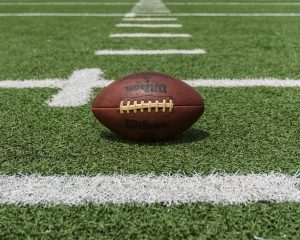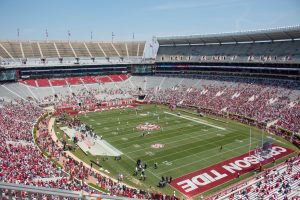How to Succeed: Sports PR Edition

Published on April 17, 2020, at 7:03 p.m.
by Jordan Axel.
When it comes to working in the sports industry, many chose a major related to sports due to their passion for the game. But when it comes to building a successful career, or even landing a position after graduation, simply loving sports is far from enough.
Stasia Foster is a departmental assistant for Creative Arts Agency (CAA) AMP, a brand consulting business unit within the CAA Sports Division. She graduated from The University of Alabama in 2018 with a degree in public relations.
Kai Brashears is the coordinator of recruiting operations for Mississippi State University Football. Brashears works in conjunction with the director of on-campus recruiting to execute all on-campus recruiting efforts. She graduated from The University of Alabama in 2019 with degrees in public relations and English.
Through the following Q&A, they shared their first encounter with the industry, how to stand out when applying to jobs and advice for aspiring PR professionals in the sports industry.
What sparked your interest in the sports industry?
Stasia: “What initially sparked my interest in the sports industry was seeing how a sporting event provided so many experiences for consumers across the globe. The idea that one event could bring so many people together in celebration was so vast and beyond my scope that I wanted so badly to be a part of it — providing unforgettable experiences for the superfan and average consumer alike.”
Kai: “I have always loved sports and the way they bring people together. When I got to college, I was looking to get involved on campus in a way that would allow me to act as an ambassador for my school. I tried out for the hostess group on campus for the football team and ended up loving it! I enjoyed interacting with all different types of people and felt that the team environment included the staff.”
What was your first experience working with sports?
Stasia: “Aside from always being the sports editor for my middle school and high school yearbooks, my first official experience working with sports was during my junior and senior years of high school being an ‘iReporter’ (intern reporter) for a central Texas radio show called ‘Friday Night Fanstand,’ covering high school football year-round. I interviewed players and coaches in the studio and on the field, covering my high school team’s journey through the off-season, summer workouts, 7-on-7, regular season, post-season, and signing day, while also going on assignment to various practices and games all over central Texas.”

Kai: “My first experience working with sports was in the hostess group for [University of] Alabama Football. Our job was essentially to be a ‘friend for the day’ for recruits and their families. We worked under the director of on-campus recruiting, and I loved the work so much that I decided to pursue it as a career. I enjoyed helping young student-athletes make the biggest decision they have made thus far and ensuring that their parents are comfortable and excited about it.”
The sports industry can be very competitive. When applying to jobs/internships, how did you set yourself apart from the pack?
Stasia: “To give myself a competitive edge, I always prepare thoughtful questions to ask the interviewer. I ask them for professional feedback on my delivery, presentation, résumé, etc., and I send them a hand-written, thank-you note. … By asking for their professional feedback, it shows that you not only value their opinion but that you’re coachable and can handle constructive criticism. … Once hired, I have asked all of my employers why they hired me, and they mention one, if not all, of the above things as the thing(s) that set me apart.”
Kai: “Sports hires are about who you know; retention is about what you know and how well you do the job. A lot of hires are based purely on recommendations and brief interviews. The best thing a young person can do to set themselves up for success in sports is to make as many friends in the industry as possible. If a hiring manager reaches out to someone they trust for a recommendation, they will fight for the recommended person whether or not they know them personally. The relationships that I made as a recruiting hostess helped me get my job, but the skills and work ethic I learned have helped me keep it.”
What is something you did in college that properly prepared you to enter into the workforce with confidence?
Stasia: “I’m not sure if this was something I did intentionally as much as it was something that I found value in, but I got comfortable with being the youngest person in the room and holding my own. … My first role at CAA in the football division was in an office of 16 people, including the head of the division, and everyone I worked with was over 10 years my senior. I was young and everyone knew it, so it became really important for me to always maintain a level of maturity in all professional settings.”

Kai: “I highly recommend being involved in anything and everything that piques your interest in college. My original plan was to pursue a career in entertainment PR, and it was only because I was open to trying new things that I found my passion. I was also involved in multiple committees on campus and in my sorority where I learned skills surrounding teamwork and social media; plus it helped me hone my interests. Leaving college, I was confident in my direction and what I wanted to pursue. I felt prepared and confident going into the workforce.”
PRSAY released an article several years ago that discussed building a career in sports PR. One of the listed keys to success in sports PR was the ability to communicate effectively. How did you fine-tune your written and verbal communication skills?
Stasia: “To fine-tune my written and verbal communication skills throughout college, I solicited feedback from professionals and peers. I took how I communicate with others very seriously, so noting their feedback and their response to my delivery is how I quickly learned how to best articulate my thoughts to others.”
Kai: “I think a big part of effective communication is context. Through college PR classes and involvement on campus, I learned the different ways you have to communicate with various groups of people. In sociolinguistics, it’s called ‘code-switching.’ I call it being a communicative chameleon. This includes the use of slang and colloquial language versus academic and proper English. Learning to contextualize communication is a very important part of entering the workforce.”
Although these UA alumnae are in the early stages of their careers, they both know the grit and determination it takes to break into the industry. While this article did not focus on leveling the playing field and entering a male-dominated career, these women are certainly blazing the trail for women to come.




